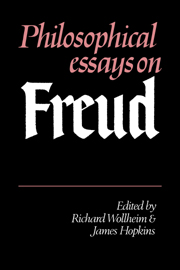Book contents
- Frontmatter
- Contents
- Introduction: philosophy and psychoanalysis
- 1 Conversations on Freud; excerpt from 1932–3 lectures
- 2 Freud, Kepler, and the clinical evidence
- 3 Critical empiricism criticized: the case of Freud
- 4 Freudian commonsense
- 5 Disposition and memory
- 6 On Freud's doctrine of emotions
- 7 The id and the thinking process
- 8 The bodily ego
- 9 Norms and the normal
- 10 On the generation and classification of defence mechanisms
- 11 Models of repression
- 12 Mauvaise foi and the unconscious
- 13 Self-deception and the ‘splitting of the ego’
- 14 Freud's anthropomorphism
- 15 Freud's anatomies of the self
- 16 Motivated irrationality, Freudian theory and cognitive dissonance
- 17 Paradoxes of irrationality
- Works of Freud cited
- Select bibliography
3 - Critical empiricism criticized: the case of Freud
Published online by Cambridge University Press: 01 October 2009
- Frontmatter
- Contents
- Introduction: philosophy and psychoanalysis
- 1 Conversations on Freud; excerpt from 1932–3 lectures
- 2 Freud, Kepler, and the clinical evidence
- 3 Critical empiricism criticized: the case of Freud
- 4 Freudian commonsense
- 5 Disposition and memory
- 6 On Freud's doctrine of emotions
- 7 The id and the thinking process
- 8 The bodily ego
- 9 Norms and the normal
- 10 On the generation and classification of defence mechanisms
- 11 Models of repression
- 12 Mauvaise foi and the unconscious
- 13 Self-deception and the ‘splitting of the ego’
- 14 Freud's anthropomorphism
- 15 Freud's anatomies of the self
- 16 Motivated irrationality, Freudian theory and cognitive dissonance
- 17 Paradoxes of irrationality
- Works of Freud cited
- Select bibliography
Summary
Within the last decade philosophy of science has developed greatly as a special discipline. Perhaps inevitably, the internal controversies which this expansion has engendered have been difficult to relate to the more general philosophical field. The difficult relationship between philosophy in general and philosophy of science in particular, is an aspect of the difficult relationship between philosophy and scientific theory. The back numbers of reputable journals are littered with articles which either utilize some illusory science as a raw material for practising philosophy on, or which hew so closely to a few minor scientific maxims that their philosophy is deformed. Both these approaches tend towards a sort of eclectic and abstract legislation about the nature of science and the conduct of scientific activity.
In the course of this paper we shall have occasion inter alia to deal with the following one-sided perspectives. One is the resort to ‘common sense’ as a court of appeal; often involved with an essentialist view of causation, in particular a reduction to ‘constant conjunction’. A second common source of confusion stems from rigid application of criteria based on falsificationist principles. We shall be finding this of particular interest since falsificationism depends upon certain assumptions, a metaphysical theory of truth and a particular view of the relations between facts and theories: assumptions which actually deflect that particular tendency within philosophy of science from dealing with those very methodological problems of scientific discovery and explanation which it formally sets itself.
- Type
- Chapter
- Information
- Philosophical Essays on Freud , pp. 32 - 59Publisher: Cambridge University PressPrint publication year: 1982
- 24
- Cited by

